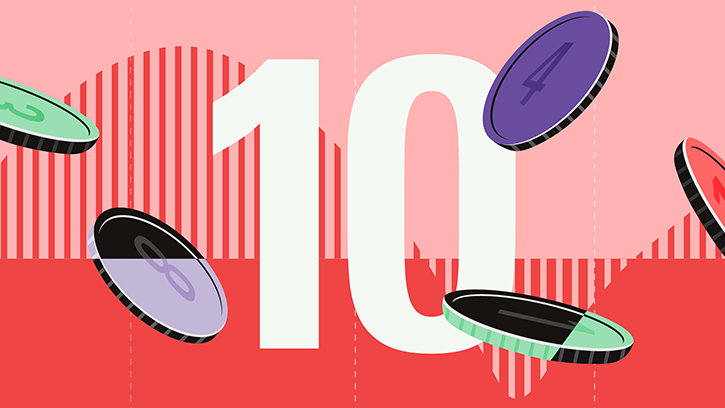
The rather abrupt return of stock market volatility in late January and early February shook investors and markets out of their previously uninterrupted bull run. Combine that with rising concern over a possible trade war between the US and China, as well as predictions for rising inflation and interest rates and most markets ended March in negative territory.
The FTSE 100 was among the worst hit, down more than 7% in local currency terms, closely followed by Japan’s Nikkei 225 down more than 5%. The S&P 500 saw a minimal loss, with Hong Kong’s Hang Seng one of the few main indices showing positive movements.
Protectionist trade barriers from President Trump; lower-than-expected borrowing figures in the UK; a thawing of geopolitical tensions between North Korea and the US but growing tensions between Russia and the West combined for a “very interesting” first quarter of the year, according to Ben Yearsley, director at Shore Financial Planning.
“Throw in a new Fed chair and an inconclusive Italian general election result and it’s little wonder markets are down,” he adds.
As a result, investors have struggled to make gains in the year to date. That’s borne out by the fact that only four Morningstar top rated investment trusts showed positive total returns in the first quarter of 2018.
Below, we profile the best and worst performers that are rated highly by Morningstar analysts.
5 Best Performing Top Rated Trusts
Despite fears the current stock market bull run is coming to an end, all five of the best performers were equity-oriented. That said, the fifth in the list, the Bronze Rated Baillie Gifford Japan (BGFD), lost value – to the tune of just 0.03%.
That was one of two country-specific offerings in the list, which was headlined by JPMorgan Russian Securities (JRS). We’ve outlined some bullish views on the outlook for Russian equities from both fund managers and Morningstar Investment Management analysts previously.
The stock market is attractively valued, the economic environment benign and oil prices have stabilised. As a result, Russian stocks outperformed, with the Morningstar Russia index up over 9% in Q1.
JPMorgan Russian Securities underperformed that, returning 6.16%, but was still top dog. Managed by Oleg Biryluyov, the trust invests in attractively priced, quality businesses with strong growth. The top two holdings, Sberbank (SBER) and Gazprom (GAZP), account for a third of the portfolio.
That was narrowly followed in performance by BlackRock Frontiers (BRFI), managed by Sam Vecht, at 5.95%. For Vecht and co-manager Emily Fletcher, understanding their companies is key and they meet management as well as suppliers, customers and investors.
As at 31 January, 15% of the portfolio was in invested Argentina, with 10% in Kuwait. More than a third of the portfolio was focused on financials, with Argentinian’s Grupo Financiero Galicia (GGAL), The National Bank of Kuwait (NBK) and Kazakhstan’s Halyk Savings Bank (HSBK) top holdings.
Meanwhile, two global equity funds sat in third and fourth place, with the Gold Rated Scottish Mortgage (SMT) and Bronze Rated Edinburgh Worldwide (EWI) returning 1.99% and 1.24% respectively. The former would have been higher up had it not de-rated 12% over the past three weeks.
5 Worst Performing Top Rated Trusts
Similarly, all five of the worst-performing rated trusts were equity focused. Unsurprisingly, UK equity income offerings filled three of the spots – second, third and fourth.
The Bronze Rated pair of Standard Life Equity Income (SLET) and Perpetual Income & Growth (PLI) lost 10.3% and 9.06% respectively; The Silver Rated Edinburgh Investment (EDIN) shed 8.98%.
It’s no secret that UK assets have performed poorly recently and sentiment has waned. However, Yearsley suggests that, with end of tax year ISA money being invested and new tax year money about to go in, UK equity income may not be “such a bad idea for contrarian investors”.
Though analyst Peter Brunt thinks SLET is “expensive relative to peers”, the other two get mentions for their competitive pricing. SLET, though, has the advantage of being “genuinely differentiated UK equity income product”. Perpetual and Edinburgh, both run by Invesco’s Mark Barnett, have nine of their largest 10 holdings in common; SLET has two of those in its top 10.
A JPMorgan country specialist trust was top of this list, but there was also one at the bottom. JPMorgan Indian (JII) was the worst-performing top rated vehicle in the first quarter, losing 11.48% of its value.
Managed by Rukhshad Shroff and Rajendra Nair, the Bronze Rated offering almost lost twice as much as its Morningstar benchmark, MSCI India down 6.95%. Another trust that is currently focused on financials, with HDFC Bank (500180), Axis Bank (532215) and IndusInd Bank (532187) in the top five holdings.
Morningstar’s Mark Laidlaw likes the trust due to its experienced management duo, who have worked together on the strategy since 2005. The process sees the pair buy high-quality companies and allow the long-term secular growth of the Indian economy to drive returns.
Murray International (MYI) was fifth-worst performer, down 8.97%.

































